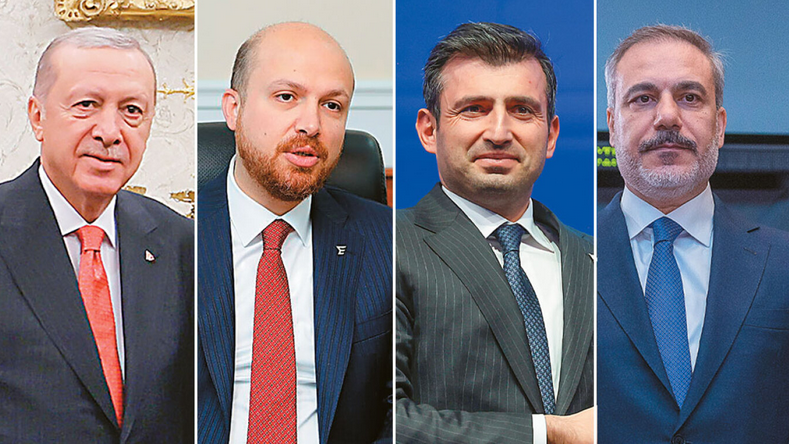From the first moments of his warm reception at the White House, walking slowly next to his sprightly 79-year-old “friend” and U.S. President Donald Trump, the expressionless 71-year-old Recep Tayyip Erdoğan hardly resembled the proud and self-confident leader who has held Turkey’s reins for 22 years.
The reason? Rumors about the real state of his health, as well as the rules of the neighboring country’s electoral system, have since spring fueled scenarios about his succession: a new candidacy would require either a change in the current constitutional framework or the calling of early elections. Erdoğan himself has called for a “new Constitution,” though this year he stated, “I have no interest in being re-elected or running again.”
Nevertheless, within his party, it seems almost certain that he intends to remain in power beyond 2028, when his term ends — even though earlier this year he gave a cryptic reply to a famous singer who asked whether he would run again, saying, “I will be a candidate if you are.” This is all the more relevant given that the Turkish president trails in many polls behind the imprisoned mayor of Istanbul, Ekrem İmamoğlu, whose continued detention in Silivri Prison boosts his popularity month by month within Turkish society.
Since coming to power in 2002, Erdoğan has sought to impose a neo-Ottoman model as an indirect challenge to the Western way of life and to Turkey’s Kemalist legacy. Indeed, “Erdoğan’s Turkey” in 2025 is a political structure built on a highly personalized power mechanism he created through the AKP — entirely controlled by him and capable of paving a succession path with the blessings of the current president.
The “Unproclaimed Successor”
In the post-Erdoğan era, as he himself has set it in motion, the chances of an outsider rising to the top of Turkey’s political scene appear vanishingly small. Already, his younger son, Bilal Erdoğan, 44, is viewed by many analysts as the “unproclaimed heir to the Turkish throne.” A smooth transition within the family would allow Erdoğan to establish a family dynasty, while also providing a shield protecting family members from possible investigations or challenges to his legacy.
At the same time, Bilal Erdoğan is already considered a powerful figure within his father’s administration and the AKP. His studies in the United States broadened his international network, including with the Muslim Brotherhood. Signals pointing to Bilal moving closer to his father’s “ring” were interpreted in the 2023 dismissals from the Cabinet of Hulusi Akar (Defense Minister), Süleyman Soylu (Interior Minister), and then-Foreign Minister Mevlüt Çavuşoğlu — moves that intensified the impression that the “Sultan” was cleaning house within his party to prepare for succession. Bilal gained even more ground as a kind of “grey cardinal,” as many social media users call him.
Mevlüt Çavuşoğlu was succeeded at the Turkish Foreign Ministry by Hakan Fidan, the former head of the National Intelligence Organization (MIT), a man with a polite demeanor and a distinctly “Western” image. Many analysts note meaningfully that his political future could signal Turkey’s return to a more modern model — positioning him as someone capable of leading the country beyond “Erdoğanism.” This term describes the unique architecture Erdoğan has built, intertwining the country’s political, economic, and social life, where boundaries are often blurred, reinforcing the authoritarian character of his regime.
However, some still see Hakan Fidan as “Erdoğan’s shadow,” unlikely to challenge the succession plan. In recent days, criticism has mounted over the economic and political results of Erdoğan’s negotiations in the U.S., with social media posts increasingly pointing out that the Turkish Foreign Minister would have handled matters more effectively.
Erdoğan’s current Foreign Minister is, in some way, also expected to have a role in Turkey’s “day after.” This is indirectly confirmed by the reported conflict among the potential successors of Tayyip Erdoğan. The dismissed journalist Huseyin Günay revealed that “they’re betting on Fidan… He accidentally let slip information about the aircraft engines, but no one knew…” He added, “there is an internal struggle between Bilal (Erdoğan), Hakan Fidan, and the son-in-law (Selçuk Bayraktar).”
The Technocrat
Any internal struggle between these three figures can only stem from the “Sultan’s ring,” given that Erdoğan’s son-in-law, Selçuk Bayraktar, is also seen by many analysts as a potential future leader of Turkey in the 21st century. Bayraktar represents the technocratic version of succession: he is one of Turkey’s most popular businessmen, both among the younger generation and within the Armed Forces. He has over 1.2 million followers on Facebook and 313,600 on LinkedIn.
According to Forbes, Selçuk Bayraktar owns 52.5% of Baykar, the flagship company of Turkey’s military drone industry, and serves as its president and CEO. Although he and his brother Haluk inherited the company from their father, Özdemir — originally a car parts manufacturer — Selçuk transformed it into one of the most dynamic unmanned aerial vehicle companies in the world. Baykar reached $1.9 billion in sales in 2023 and $1.8 billion in exports in 2024, mainly to Europe, Africa, and the Middle East.
The company’s most successful product, the Bayraktar drone, has been exported to over 31 countries. The fact that the Turkish president’s son-in-law heads the country’s most promising technological sector — one that has, for the first time, made Turkey a welcome partner in Europe’s common defense landscape — further strengthens his position in Erdoğan’s succession circle.
Selçuk Bayraktar entered the “Sultan’s” family in 2016, after completing his studies in Istanbul and earning graduate degrees from the University of Pennsylvania and the Massachusetts Institute of Technology (MIT). That year, he married Erdoğan’s youngest daughter, Sumeyye, to whom the president has a notable emotional attachment.
Their lavish, fairytale-like wedding, staged as both a display of opulence and political power, symbolically brought technology, massive defense investments, and the military establishment into Erdoğan’s inner circle. Within this circle, Sumeyye holds a prominent role as a senior presidential adviser, embodying the new conservative order of the AKP — and possibly, its future leadership.
Explore related questions
